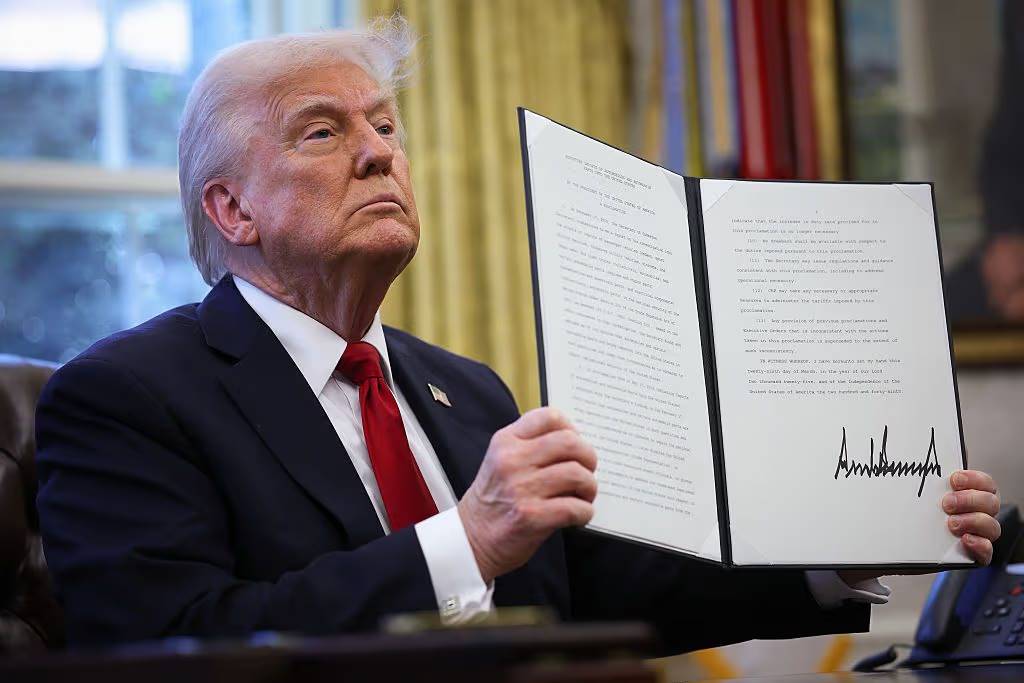Economic uncertainty may drive investors to turn to Bitcoin, much like they have sought gold in recent months.
Author: Benjamin Schiller
Translation by: Deep Tide TechFlow
With the Trump administration announcing tariff policies on "Liberation Day" Wednesday, many hold a pessimistic view of the overall economy and cryptocurrency prices. However, analysts say there are ample reasons to remain optimistic.

U.S. President Donald Trump signed an executive order on March 26, 2025, in the Oval Office of the White House, announcing a 25% tariff on all foreign-made cars.
Image source: Win McNamee/Getty Images
More Information:
Bitcoin prices have significantly dropped during the Trump administration, contrary to investor expectations.
Economic uncertainty and tariff policies have prompted investors to turn to safer assets like gold, impacting the crypto market.
Analysts believe tariffs may weaken the dollar's dominance, potentially benefiting Bitcoin in the long run.
So far, the performance of the crypto market during the Trump administration has been vastly different from expectations. Investors had hoped that regulatory reforms and policies like Bitcoin as a strategic reserve would significantly boost prices, but the opposite has occurred. At the beginning of the year, Bitcoin prices soared above $100,000, but by March, they had mostly fallen to around $85,000.
Cryptocurrency prices have been dragged down by increased correlation with traditional assets like stocks and bonds, which are suffering due to macroeconomic uncertainty. Tariffs—additional costs imposed by the U.S. on imported goods from other countries—have raised concerns on Wall Street about a global economic recession. Crypto investors are moving away from crypto assets, as these are seen as relatively high-risk.
"This all relates to the market's 'risk appetite,' which has been deteriorating, creating a temporary split between crypto assets and gold. Gold continues to be the preferred 'safe-haven asset,'" said Marc Ostwald, chief economist and global strategist at ADM Investor Services.
"This is largely driven by central bank foreign exchange reserve managers who are trying to reduce their exposure to the dollar, which has long been a concern for them."
As the global financial and trade system becomes increasingly fragmented, investors are seeking lower-risk asset alternatives, including the dollar. Currently, this means turning to gold, which has risen 18% so far this year.
However, this situation may change, as Omid Malekan, a part-time professor at Columbia Business School and author of "The Story of Blockchain: A Beginner's Guide to the Technology No One Understands," suggests that Bitcoin may soon become the new gold.
"I think the entire future is filled with uncertainty, and in some ways, even unpredictable, due to the many intersecting factors at play, with cryptocurrencies and tariffs being new areas. Some believe cryptocurrencies are just a tech asset tied to risk appetite and will be sold off due to tariffs. But Bitcoin is seen in some circles as 'digital gold,' and physical gold is rapidly rising in response to tariff news. So which outcome will prevail?"
In other words, economic uncertainty may prompt investors to turn to Bitcoin, much like they have sought gold in recent months.
Another positive signal is that the impact of tariffs on cryptocurrencies may have already been "priced in," and the worst may be over, according to Zach Pandl, head of research at Grayscale, a leading crypto asset management firm.
President Trump is expected to announce U.S. tariff policies on Wednesday, April 2, at 4 PM Eastern Time, also known as "Liberation Day" (Liberation Day). He is reportedly set to unveil "reciprocal tariffs" against 15 countries that impose tariffs on the U.S., including China, Canada, and Mexico.
Pandl estimates that tariffs have already reduced economic growth by 2% this year. However, "Liberation Day" may alleviate some of the most severe pain felt in financial markets. "If we see a tough but phased-in statement on Wednesday, particularly targeting the 15 countries they seem to have locked in, I expect the market to react positively to this news," Pandl said in an interview with CoinDesk.
"Once we get past this announcement, the crypto market may refocus on fundamentals, which are very positive."
Pandl noted that announcements like Circle's IPO won't happen unless institutions are confident in the digital asset space and related policies.
Additionally, Pandl—who previously worked as a macroeconomist at Goldman Sachs—believes tariffs will increase demand for non-dollar currencies.
"I think tariffs will weaken the dollar's dominance and create space for competitors, including Bitcoin. Prices may drop in the short term. But the first few months of the Trump administration have further strengthened my long-term confidence in Bitcoin as a global monetary asset."
Despite the current market's pessimism about prices, Pandl still believes Bitcoin will reach new all-time highs this year. "If I didn't think Bitcoin would be a long-term winner, I wouldn't have left my Wall Street job," he said.
免责声明:本文章仅代表作者个人观点,不代表本平台的立场和观点。本文章仅供信息分享,不构成对任何人的任何投资建议。用户与作者之间的任何争议,与本平台无关。如网页中刊载的文章或图片涉及侵权,请提供相关的权利证明和身份证明发送邮件到support@aicoin.com,本平台相关工作人员将会进行核查。




